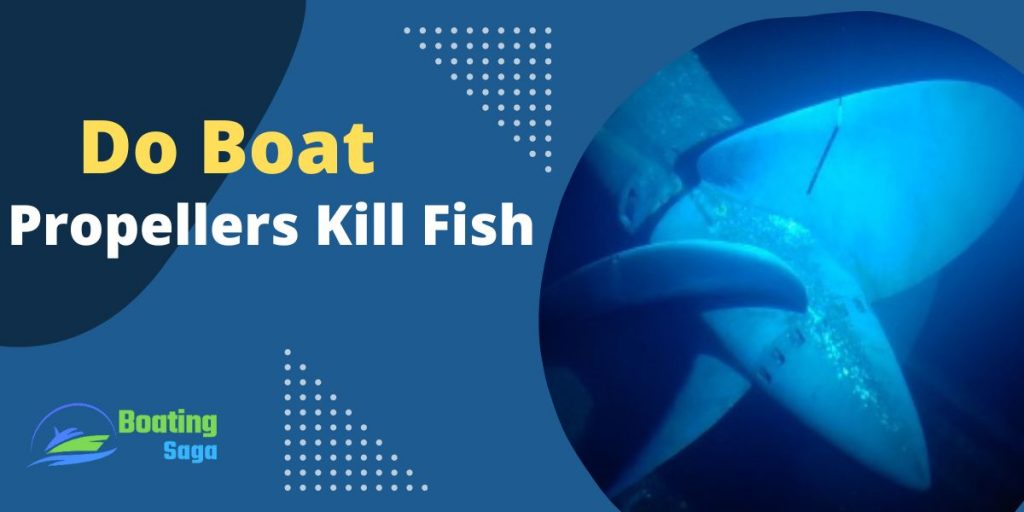
There is a lot of discussion about whether boat propellers kill fish. Some people say that they do, while others claim that there is no evidence to support this claim.
Do Boat Propellers Kill Fish?
The truth is that boat propellers can kill fish specially the small one, but it depends on a number of factors, such as the size and type of propeller, the speed of the boat, and the water conditions. However, boats that move faster through the water are more likely to kill fish than those that move more slowly.
While there are many theories about why this happens, the bottom line is that it does happen and it needs to be addressed.
How Do Boat Propellers Kill and scare Fish?
Though often seen as a necessary part of a boat, propellers can be deadly for fish.
The spinning blades create powerful vortices in the water that can easily suck fish in and chop them to pieces.
The turbulence created by the propeller can reduce the amount of dissolved oxygen in the water, leading to suffocation.
Propellers are also known to cause cavitation, which is the formation of bubbles on the propeller blades. These bubbles quickly collapse and release energy in a way that can damage nearby organisms.
In addition, propellers create a lot of noise which can scare fish away from their natural habitats and make them stressfull which can lead to death.
Altogether, propellers pose a serious threat to fish populations and should be used with caution near waterways inhabited by fish.
How Can You Tell if a Propeller Has Killed a Fish?
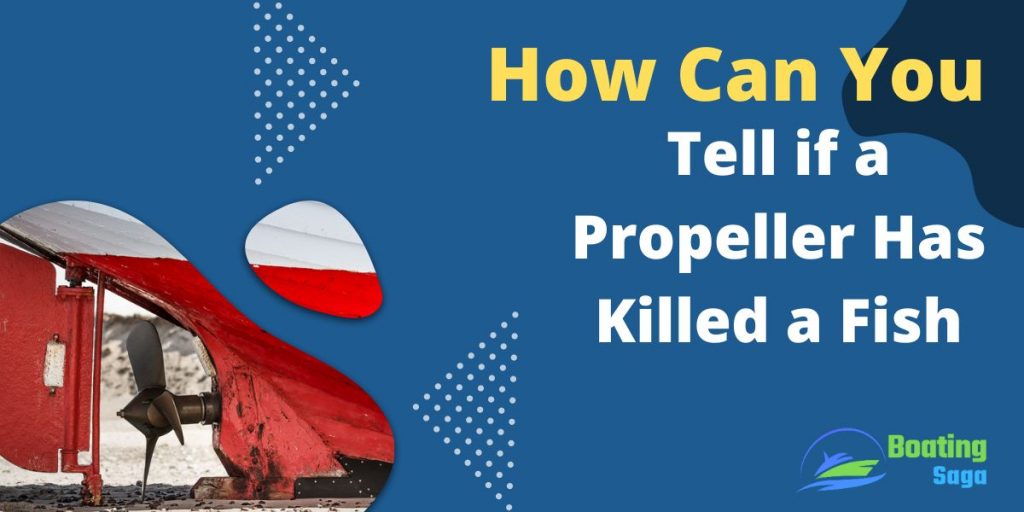
When you’re out on the water in your boat, it’s important to be aware of how your actions could be affecting the wildlife. One thing to be conscious of is propeller strikes. A propeller strike can kill a fish, and it’s not always easy to tell if one has occurred.
Here are some things to look for if you think you may have struck a fish with your propeller:
– The easiest way to determine if a propeller has killed a fish is by looking for damage to the blade. If there are fresh gashes on the blade, then it is likely that the propeller has killed a fish.
– One thing to look for is fishing line caught around the propeller. If you see any line wrapped around the propeller, it’s likely that the propeller killed the fish.
-You can also look for scales or blood near the boat. If you see any evidence of this, it’s likely that the propeller was responsible for killing the fish.
– If the tail is missing or looks like it has been cut off, then there is a good chance that the fish was struck by a propeller.
-The victim may be visible near the surface or just below the surface.
It’s important to remember that not every incident involving a propeller and a fish is fatal.
How Many Fish Are Killed by Propellers Every Year?
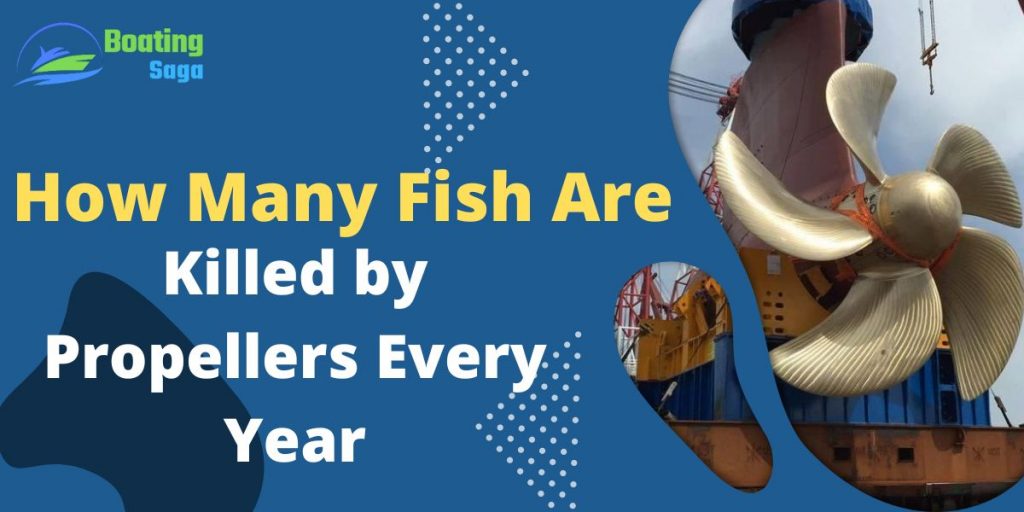
A study found that anywhere from 1.5 to 18 million fish are killed by boat propellers every year in the United States. That may not seem like a lot, but consider that there are about 85 million recreational boaters in the country, it starts to add up. And that’s just recreational boats – commercial vessels kill many more fish.
Most of the fish killed by propellers are small and harmless, but they provide an important food source for larger fish and marine mammals. So while the loss of 1.5 million fish may not seem like a big deal, it can have a significant impact on the ecosystem.
Does Container and Cruise Ships Propeller Kill Big Fish?
The cruise industry is a booming business, with more and more ships hitting the seas every year. But there’s a downside to all those passengers enjoying their vacations: the impact of these massive vessels on local ecosystems.
One major concern is how cruise ships’ propellers kill big fish. Studies have shown that when these boats move, they create powerful vortices in the water that can suck fish in and chop them up.
This has raised concerns among scientists and environmentalists, who worry about the impact of cruise ship propellers on already fragile marine ecosystems. Some have called for a ban on large cruise ships in sensitive areas, while others are calling for more research into the issue.
What Are the Effects of Propellers on Fish?
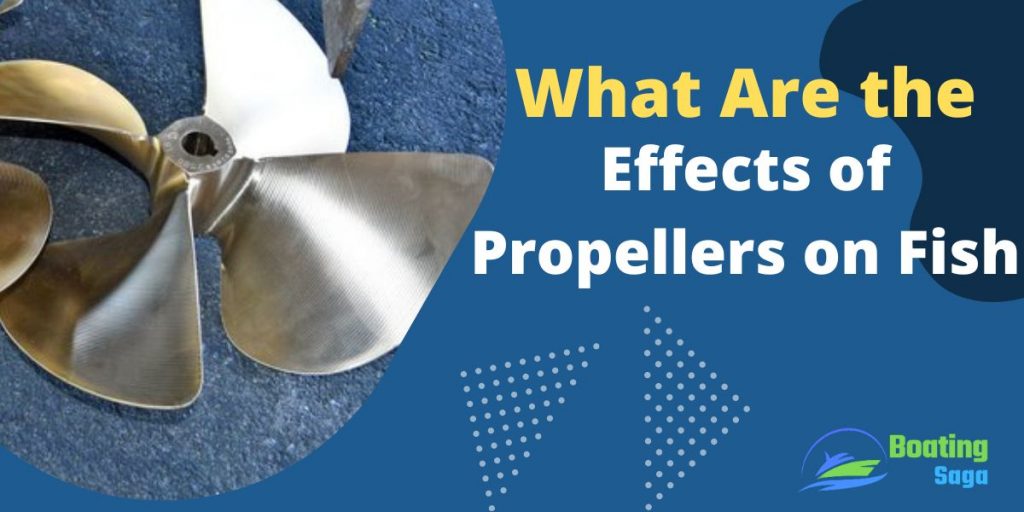
The most obvious effect of propellers on fish is physical injury. Propellers can cause cuts, scrapes, and bruises, as well as more serious injuries such as broken bones and lacerations. In some cases, propeller blades can even remove chunks of flesh from a fish’s body.
Aside from the physical injuries that propellers can inflict, they also pose a threat to fish by causing them to become disoriented.
What Are the Environmental Impacts of Propellers on Fish?
When a boat travels through the water, the propeller creates a wake of turbulence. This turbulence can be harmful to fish and other aquatic life. The propeller can cause fish to be injured or killed by hitting them with the blades or sucking them into the engine.
The propeller also creates noise and vibration that can disrupt fish behavior and interfere with their ability to communicate and find food. Propellers can also stir up sediment on the bottom of the lake or river, which can clog the gills of fish and make it difficult for them to breathe.
How Do You Avoid and Prevent Propellers From Killing Fish?
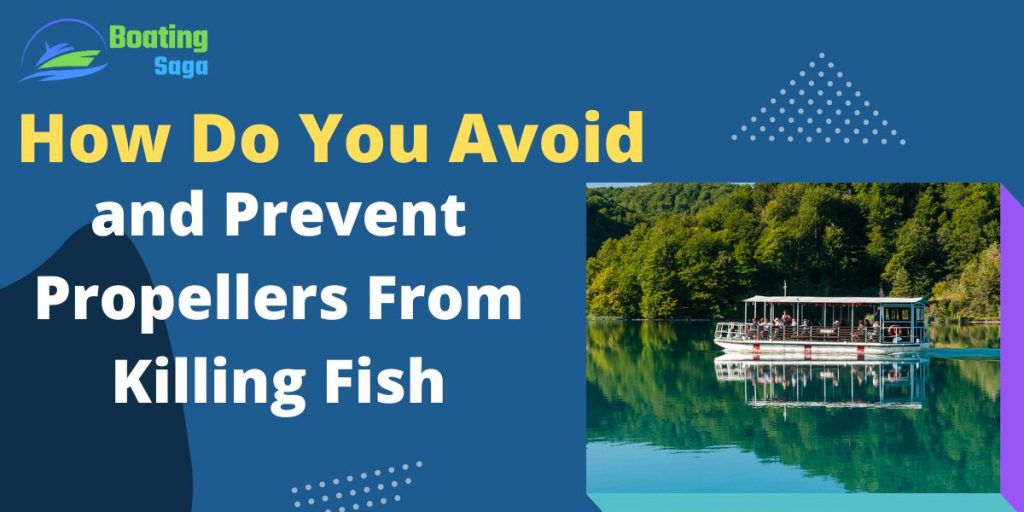
Propellers are a necessary piece of machinery on any boat, but they can also be deadly for fish. Here are some tips on how to avoid and prevent propellers from killing fish:
Use a Boat With a Propeller Guard
When you’re out on the water in your boat, it’s important to take precautions to protect the environment. One way to do this is by using a propeller guard. This will help prevent your boat from killing fish as you move through the water.
A propeller guard is a simple device that attaches to your boat’s propeller and helps deflect objects and debris away from the blades. This can help reduce the number of fish that are killed by your boat’s propeller.
Propeller guards are available for both outboard and inboard boats, and they come in a variety of shapes and sizes. So if you’re concerned about harming aquatic life while boating, be sure to use a propeller guard.
Avoid Areas With High Concentrations of Fish
Fish are attracted to the noise and movement of a boat, and they can get injured or killed if they’re struck by the propeller.
In order to protect the fish, it’s important to slow down when you’re near them and be especially careful when turning your boat. If you must go through an area with a lot of fish, try to do so slowly and make as few turns as possible. It’s also important to keep an eye on your surroundings so that you don’t run over any fish that may have been injured by the propeller.
Advocate for Change in the Way Propellers Are Designed
There is a push to change the way boat propellers are designed in order to protect fish. Some people feel that the blades on propellers are too sharp and cause too much damage when they come into contact with fish. They would like to see propellers with more rounded edges that would not kill as many fish.
Others argue that the blades on propellers are not sharp enough and that more rounded edges would not do enough to improve the situation. They believe that a better solution would be to add screens or nets around the propellers to keep fish from coming into contact with them.
Whichever side of the argument you fall on, it is clear that something needs to be done to improve the way propellers interact with fish.
Educate Boaters About How to Avoid Propeller Strikes
Every year, there are accidents involving propellers and boats. Some of these accidents lead to serious injuries or death. There are ways to avoid these accidents and protect both boaters and fish.
One way to avoid propeller strikes is to educate boaters about how to properly operate their boat. Boaters should be aware of their surroundings at all times and should always use caution when maneuvering their boat. They should also know where the safe zones are for docking and swimming.
Support Organizations Who Are Working to Protect Fish Populations
A number of organizations are working to protect fish populations from being overkilled. These organizations provide information and guidance on how to reduce the number of these accidents, as well as how to mitigate their effects when they do happen. Boat operators can play a role in protecting these populations by following the guidelines provided by these organizations.
Related Questions:
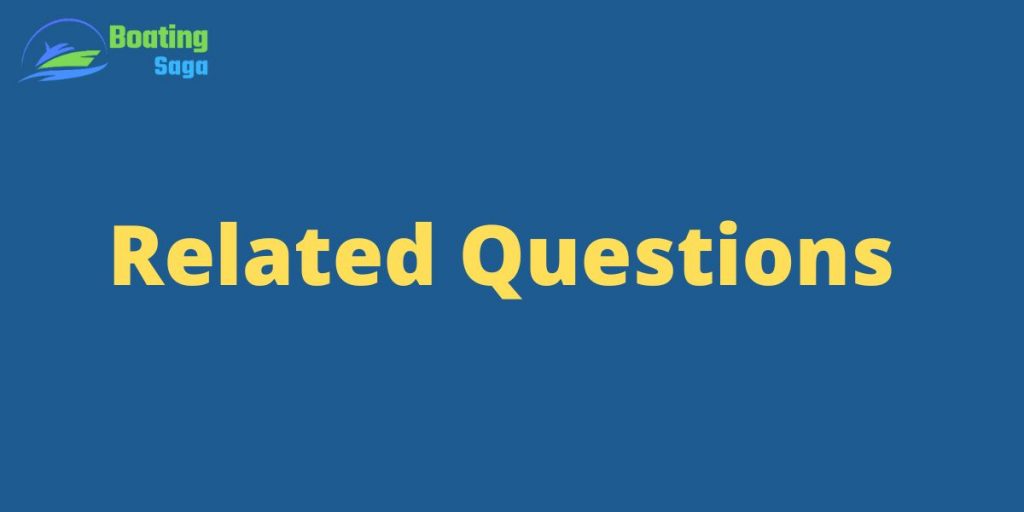
Has a Whale Ever Hit a Cruise Ship?
There are many myths and legends about boats and whales. One popular myth is that a whale has ever hit a cruise ship or its propeller. Some people even believe that a whale can sink a boat by swimming into its propeller. However, there is no evidence to support these claims.
In fact, boats and whales have very little contact with each other. Boats rarely go near the habitats of whales, and when they do, the boats are much larger than the whales. Therefore, it is highly unlikely that a big whale would ever hit a cruise ship or its propeller.
Do Submarines or Its Propeller Hit Whales?
Boat traffic has increased significantly in recent years, and this is particularly true in areas where whales congregate. With more boats on the water, the chances of a collision increase. In addition, whales are often difficult to see, especially when they are below the surface of the water. This combination of factors makes it easy for boats to accidentally hit whales.
Submarines do not pose as great a risk to whales as boats do. While submarines can cause serious injury or death to a whale if they hit it, this is rare occurrence.
Read More: Why are Submarine Propellers Secret
Conclusion
Boat propellers kill fish. This is an undisputed fact. However, the extent of this problem and the best way to mitigate it are still up for debate. Some people advocate for boat propeller guards, while others think that education and awareness are the key solutions.
No matter what side of the debate you fall on, it is clear that more research is needed to find the best way to protect our fish populations.

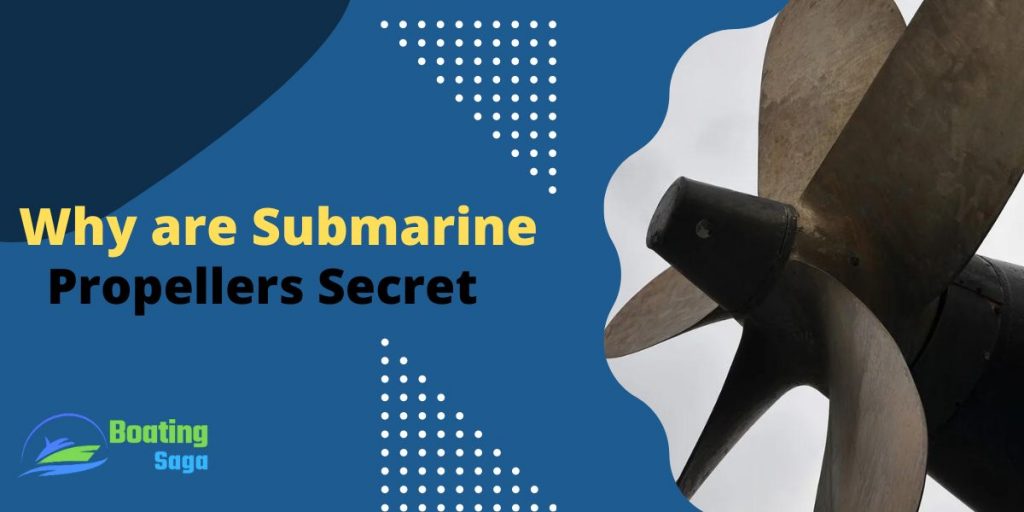

Pingback: Propeller Rings Guards and Baskets Are Designed to Do What?